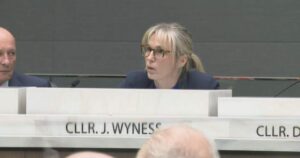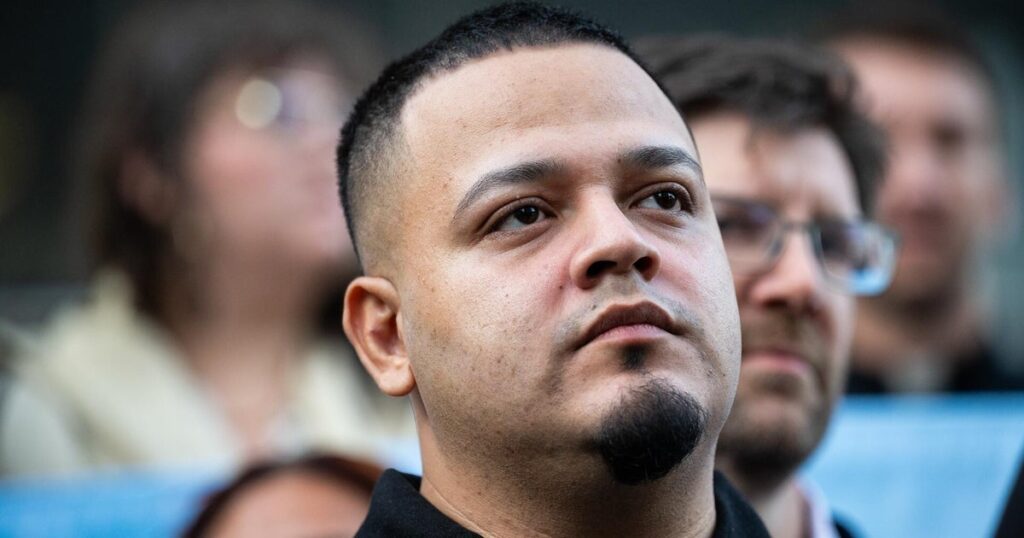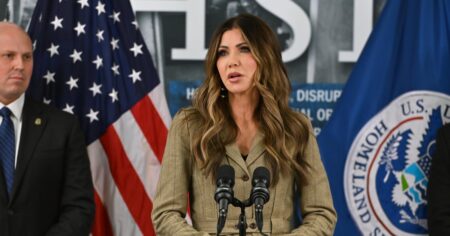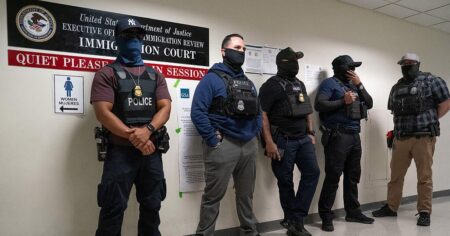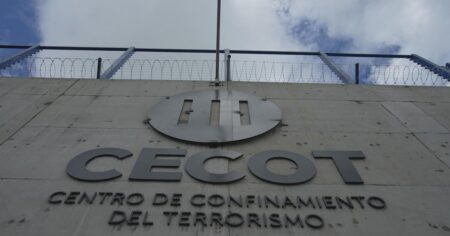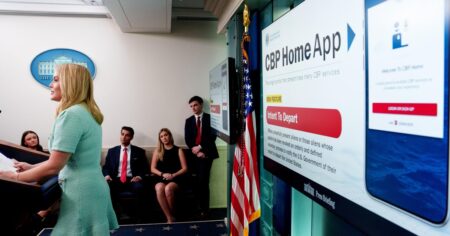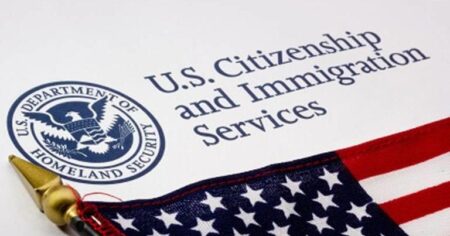Greenbelt, Md. — A federal judge on Thursday expressed frustration with the Trump administration over the testimony provided by a top immigration official who was called to address the steps the Trump administration has taken to deport Kilmar Abrego Garcia to the West African country of Liberia.
John Cantú, a senior official at Enforcement and Removal Operations at Immigration and Customs Enforcement, was the latest government witness to appear before U.S. District Judge Paula Xinis to answer questions about the potential removal of Abrego Garcia. But in each instance, Xinis has pushed back on the substance of the testimony.
“Today was a zero in my view,” she said of Cantú’s appearance.
Abrego Garcia is challenging the Trump administration’s efforts to remove him from the U.S. ahead of his criminal trial on human smuggling charges next year. Immigration authorities are now seeking to deport Abrego Garcia to Liberia, but an order from Xinis that’s been in place since August prevents the government from removing him.
Xinis did not rule on Abrego Garcia’s bid for release but said she would move quickly to address his challenge.
Cantú was summoned to testify after submitting a declaration to the court about a discussion between the State Department and the Costa Rican government about possibly accepting Abrego Garcia, as well as his potential deportation to Liberia. Abrego Garcia has designated Costa Rica as a country he is willing to be removed to, but the Trump administration has instead sought to deport him to a series of African countries.
Cantú said that if the Trump administration had the green light to remove Abrego Garcia from the U.S., the government would schedule a commercial flight or charter a plane bound for Liberia. He said that the Liberian government provided assurances to the State Department that Abrego Garcia would not be persecuted, tortured or sent back to El Salvador.
Asked about the declaration filed with the court, Cantú said he included in it information that was provided to him by the State Department.
Xinis repeatedly expressed frustration with the quality of the testimony from Cantú and at least two other federal officials who have appeared before her to answer questions about the Trump administration’s plans to deport Abrego Garcia.
She said Cantú’s answers were “the worst of all.”
“I’ve had three witnesses do this. This witness knew nothing. He didn’t know the meaning of the words in his own affidavit,” she said. “That’s extremely troubling.”
Xinis also questioned Justice Department lawyers as to whether a final order of removal had ever been issued for Abrego Garcia. A U.S. immigration judge in 2019 denied Abrego Garcia’s bid for asylum but granted him a withholding of removal, which bars immigration authorities from deporting him to his home country of El Salvador.
But Abrego Garcia’s lawyers said they have not seen a final order of removal, which they said bolstered their argument for releasing him from immigration custody.
Abrego Garcia’s case has been a flashpoint in the Trump administration’s immigration crackdown since the Salvadoran immigrant was removed from where he lived in Maryland to his native country in March. He was sent to El Salvador despite the immigration judge’s 2019 decision.
He faces deportation proceedings because he entered the U.S. illegally as a teenager in 2011.
In June, Abrego Garcia was returned to the U.S. after he was detained in El Salvador’s notorious mega-prison to face two felony charges of human smuggling. He has denied those charges.
Ahead of Abrego Garcia’s criminal trial that is scheduled to begin next year, the Trump administration has repeatedly sought to deport him from the U.S. again, proposing to send him to countries including Uganda, Eswatini and now, Liberia.
The Trump administration is urging Xinis to lift her August order barring Abrego Garcia’s deportation and allow the government to remove him to Liberia, arguing that the administration has gone through all the necessary steps to deport Abrego Garcia.
The Justice Department said that Abrego Garcia, who remains in federal immigration detention, was interviewed in October by a U.S. government asylum officer, and that officer determined that he failed to prove he would face persecution or torture in Liberia. The Justice Department said any additional due process would be unwarranted.
Abrego Garcia’s “claims are procedurally barred multiple times over and fail on the merits in any event,” the Justice Department said in its filing. “This Court should therefore dissolve its preliminary injunction and permit the government to remove Petitioner to Liberia.”
In addition, the Justice Department submitted declarations from U.S. officials stating that Liberia has made “sufficient and credible” assurances that Abrego Garcia would not be harmed there or removed from Liberia to another country where he potentially could be persecuted.
In a press release late last month, Liberia’s government said it had agreed to receive Abrego Garcia on “a strictly humanitarian and temporary basis,” following a U.S. request.
Andrew Rossman, a lawyer for Abrego Garcia, raised concerns about the lack of detail surrounding how long he could remain in Liberia and what would happen once that clock ran out.
“Is Liberia going to send him to yet another unnamed country?” he asked.
Abrego Garcia and his legal team have repeatedly challenged the government’s attempts to deport him to African nations, claiming fear of persecution or torture. They have also argued that the Trump administration’s repeated efforts to send Abrego Garcia to Africa is a form of retaliation, and Abrego Garcia should instead be sent to Costa Rica.
They noted the government had offered to send Abrego Garcia to Costa Rica this summer, but only if he pleaded guilty to the federal human smuggling charges he faces in Tennessee. The Costa Rican government initially said it was willing to accept Abrego Garcia after the conclusion of any criminal sentence he would serve, if convicted of the human smuggling charges.
But Justice Department lawyers said earlier this month that the State Department had assessed that the Costa Rican government had reversed course and wouldn’t take Abrego Garcia “at this time without further negotiations” and additional commitments from the U.S.
Drew Ensign, a Justice Department lawyer, said that continuing negotiations with Costa Rica is “not something that could easily be done.” Homeland Security Secretary Kristi Noem had also “determined that it would be preferential in the interests of the United States,” to send Abrego Garcia to an African country,” Ensign said.
“It’s so odd to me, it’s so odd. And that’s being polite,” Xinis replied, citing the “empty word salad” declaration she got from Cantú and the Trump administration’s lack of willingness to move forward with Costa Rica as the final deportation spot for Abrego Garcia.
But Rossman questioned the government’s assertion that Costa Rica is off the table and told the judge “there is no evidence at all that Costa Rica is unwilling to take my client.”
Abrego Garcia’s lawyers have argued that federal immigration officials are seeking to punish their client and denying him due process.
“The timeline suggests a pattern: when the Government received orders it disliked in Abrego Garcia’s civil case challenging his unlawful removal to El Salvador; it initiated a criminal prosecution in retaliation; and when it received orders it disliked in Abrego Garcia’s criminal case, it initiated third-country removal efforts in retaliation,” the attorneys said in a response to the Justice Department’s motion.
Abrego Garcia’s attorneys have also asked Xinis to keep her block on his deportation in place “unless and until an immigration judge concurs” with the Trump administration’s determinations.
Read the full article here



